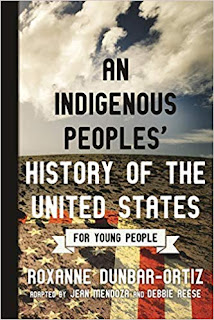On July 13, 2015, I received an invitation to adapt An Indigenous Peoples History of the United States, for young adults. Written by Roxanne Dunbar-Ortiz, I had already spent time with the book and was intrigued with the idea. Originally published by Beacon in 2014, it is packed with information and spans hundreds of years and thousands of miles.
Was it possible, I wondered, to shape it into something that young adults and classroom teachers could use? I responded to the invitation by saying "only if Jean Mendoza can do it with me."
Their answer was yes, and so, we got to work. A little over four years will have lapsed when the book is released on July 23, 2019. We worked several hours almost every day for three years, taking week-long breaks for holidays or vacation, revising the text.
Jean and I are parents but we've also taught schoolchildren, and we taught in teacher education departments at the University of Illinois and elsewhere. We had children, teens, and teachers in mind every step of the way.
"Shall we do a map, here?" and "Maybe we need to add a definition box, right here..." and "Let's add a provocative question box, here!" are some of the things we'd say to each other as we worked.
In a few weeks we'll have finished copies in hand. I can't wait to see the finished book! Right now, we've both got a bound ARC that doesn't have the index and some final revisions in it.
I think we did some really good work. I know we'll be reading it with fresh eyes and groan about something we said or didn't say--that's the nature of writing--and will be keeping track of such things for (we hope) a second or third printing, or an updated version if the book sells well enough.
I've been using Twitter to share some photos I've taken from inside the ARC:
- Navajo Long Walk, map
- Po'pay, photo
- Walt Whitman's racist writings
- Identity, a caution about DNA tests
As of today it has gotten starred reviews from Kirkus and Booklist. That's cool, but we want to hear from readers. We are especially interested in hearing from Native readers (students, parents, teachers, scholars), especially about passages that have errors or other problems. Let us know! We look forward to hearing from you.
****
Back on July 3 to post reviews!
On April 22, 2019, the book received a star from Kirkus. Here's an excerpt:
With an eye to the diversity and number of Indigenous nations in America, the volume untangles the many conquerors and victims of the early colonization era and beyond. From the arrival of the first Europeans through to the 21st century, the work tackles subjects as diverse as the Dakota 38, the Ghost Dance and Wounded Knee, the American Indian Movement’s takeover of Alcatraz, and the Dakota Access Pipeline resistance.The June 1 issue of Booklist included a starred review. That review appeared online on July 2nd as Booklist's Review of the month. Here's an excerpt:
There is much to commend here: the lack of sugar-coating, the debunking of origin stories, the linking between ideology and actions, the well-placed connections among events past and present, the quotes from British colonizers and American presidents that leave no doubt as to their violent intentions. Built-in prompts call upon readers to reflect and think critically about their own prior knowledge. Terms like “settler” and “civilization” are called into question. Text is broken up by maps, photographs, images by Native artists, propaganda, and primary-source texts that provide more evidence of the depth to which the U.S. economy was—and still is—rooted in the destruction of Indigenous lives.The July issue of School Library Journal (if the review is shared online, I'll be back with a link) includes a starred review, too! An excerpt (from the Barnes and Noble website):
Source notes and a recommended list of fiction and nonfiction titles, picture books, and novels by Indigenous authors are in the back matter. VERDICT Dunbar-Ortiz's narrative history is clear, and the adapters give readers ample evidence and perspective to help them to engage with the text. A highly informative book for libraries serving high school students.Back on July 21 to add that the Cooperative Children's Book Center at the University of Madison named Indigenous Peoples' History as its Book of the Week on July 8, 2018.



5 comments:
I think this is a hugely needed book for young people. I'm excited to read it.
I am so looking forward to reading this and adding to our school collection. We are in Canada...but as you know and has we have been discussing at school and doing activities related to that...those borders are settler borders. The Black Territory we are in runs well down into the States. Any. How! Congratulations and thanks for writing this.
Congratulations! This looks wonderful!
Congratulations! I wish we'd had this in schools when I was young...
--Veronica
Oh I'm so excited to know this book is coming! I have read the first iteration of this book, and am glad to know this new one is coming — it'll be an excellent addition to my teen homeschoolers' Lessons this coming academic year!
Post a Comment